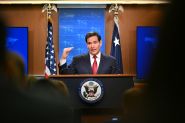
A high-level meeting on the private electricity generator sector brought together generator owners, representatives from the Ministries of Economy, Energy, Interior, and Environment, and security agencies. The session concluded with key regulatory decisions aimed at standardizing the sector.
Speaking at a press conference following the meeting, Lebanon’s Minister of Economy and Trade, Dr. Amer Bisat, described the meeting as “positive and productive,” stressing that private electricity generators are not a trivial issue for Lebanese households. “This is not merely an economic matter; it touches on the environment, security, livelihoods, and public health,” he said.
The minister highlighted that the initiative launched by the Ministry of Economy, in coordination with other relevant ministries, provides a compliance framework for the sector. He noted that the initiative was personally endorsed by Prime Minister Nawaf Salam and led to the issuance of Circular No. 31/2025, which reaffirms existing procedures and laws.
Circular 31/2025 requires generator owners to adhere to the official pricing set by the Ministry of Energy, Bisat emphasized. “This price list is not a matter of opinion; it is an official reference that we consider fair and balanced,” he said. The circular also mandates the installation of meters and filters, making these measures both a legal and ethical obligation. Bisat warned that non-compliance would trigger legal action, including fines, seizure of generators, and referral to the competent judiciary.
Bisat reiterated that compliance with the circular takes priority, with other demands to be addressed once adherence is ensured.
Addressing relations with generator owners, Bisat stressed that the measures are not confrontational but rather a call for cooperation. “Successful compliance benefits everyone,” he said, adding that a 45-day grace period has been granted to ensure adherence.
The minister concluded by framing the move as part of a strategic state effort to assert authority not only at borders and ports but also in sectors directly affecting citizens’ daily lives. “The goal is to restore trust in the state and its institutions, confirming their role as an enforcer, regulator, and monitor of the economy,” he said.



Comments